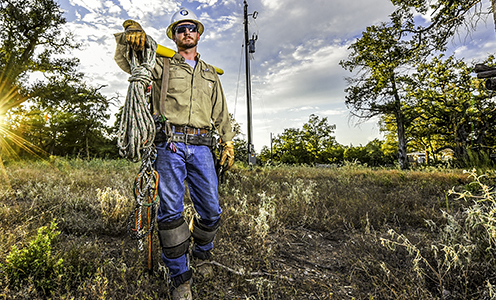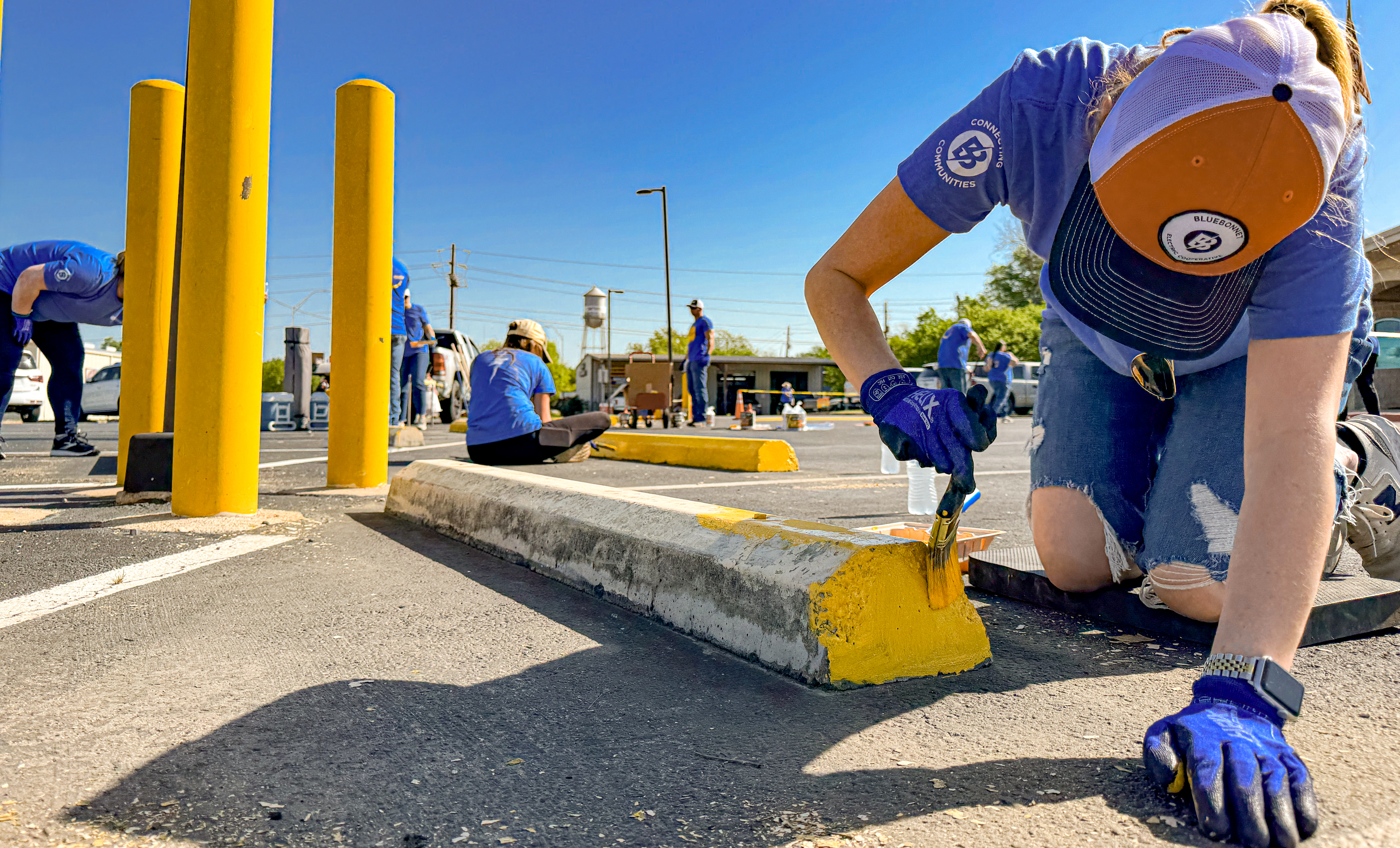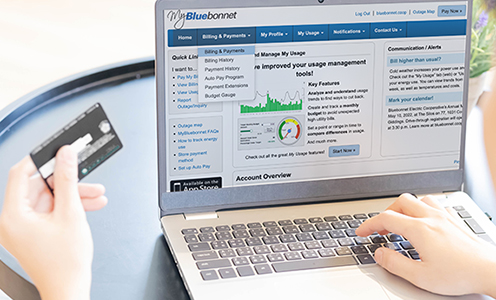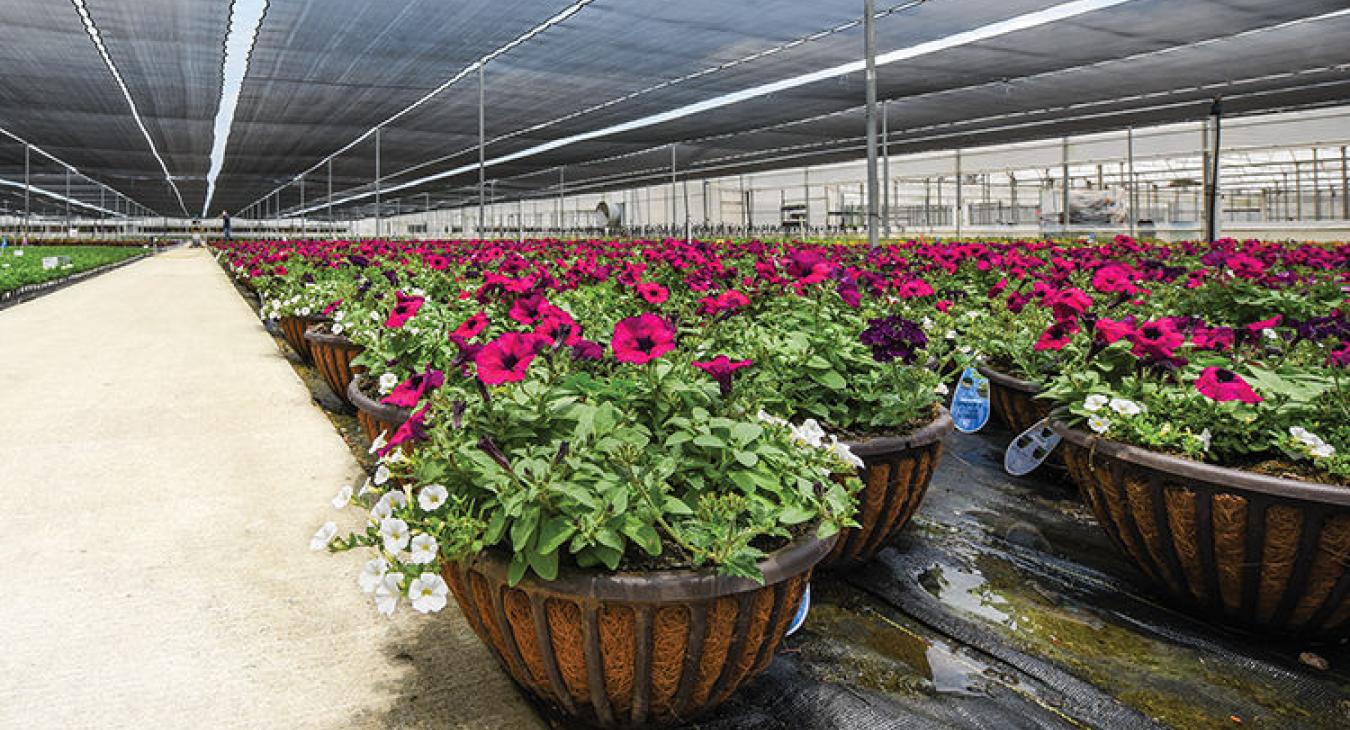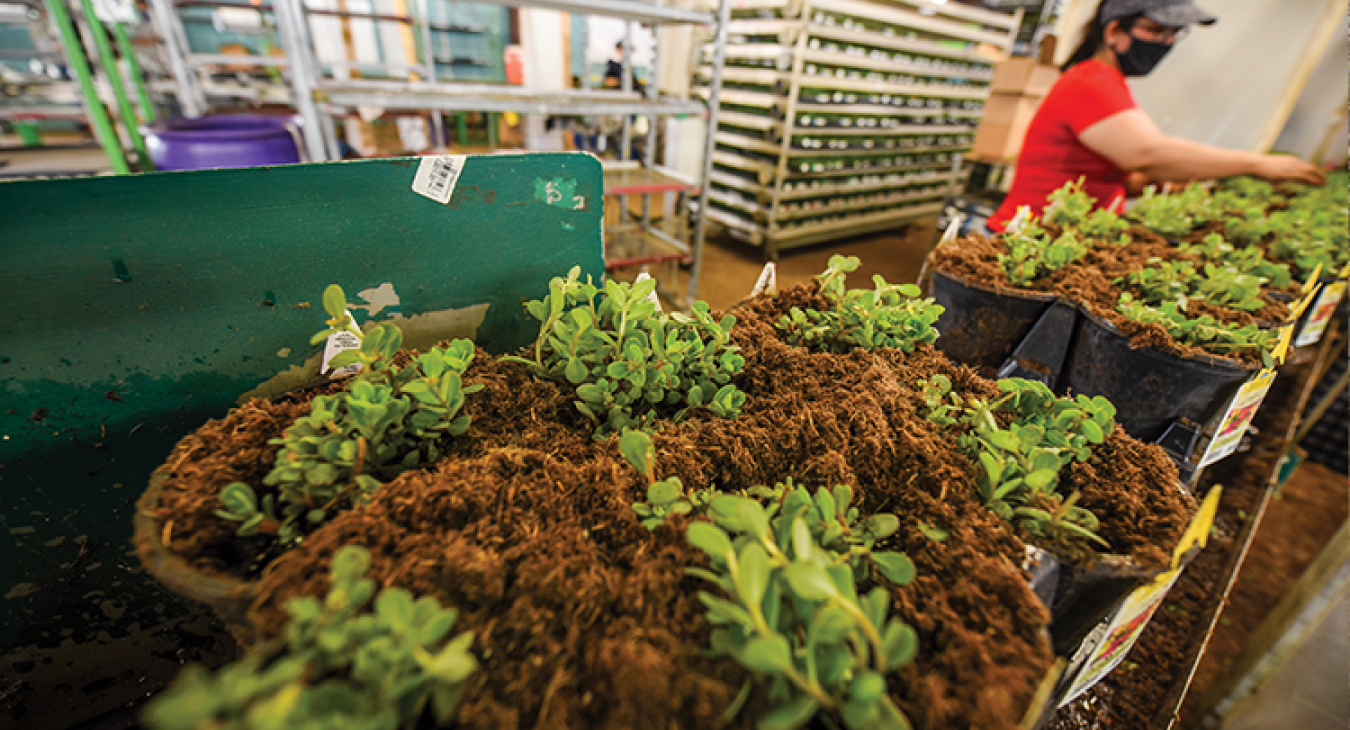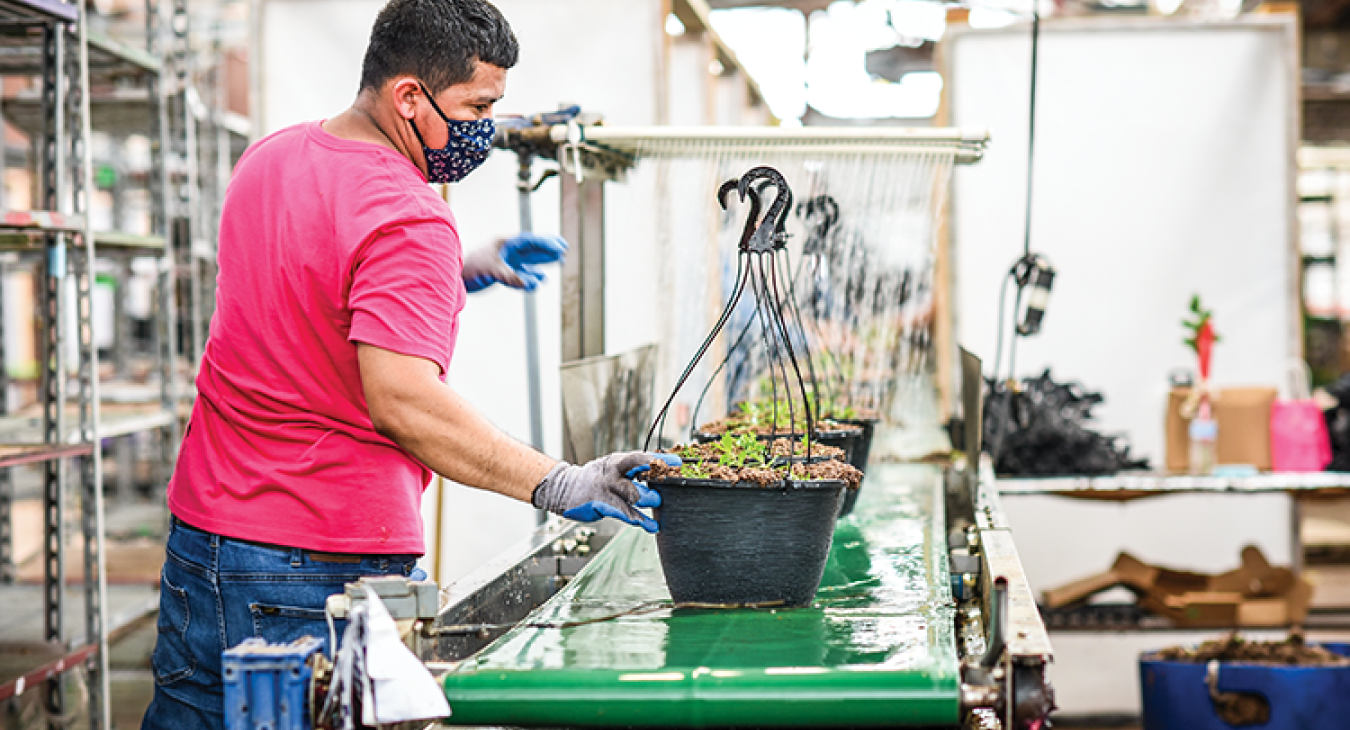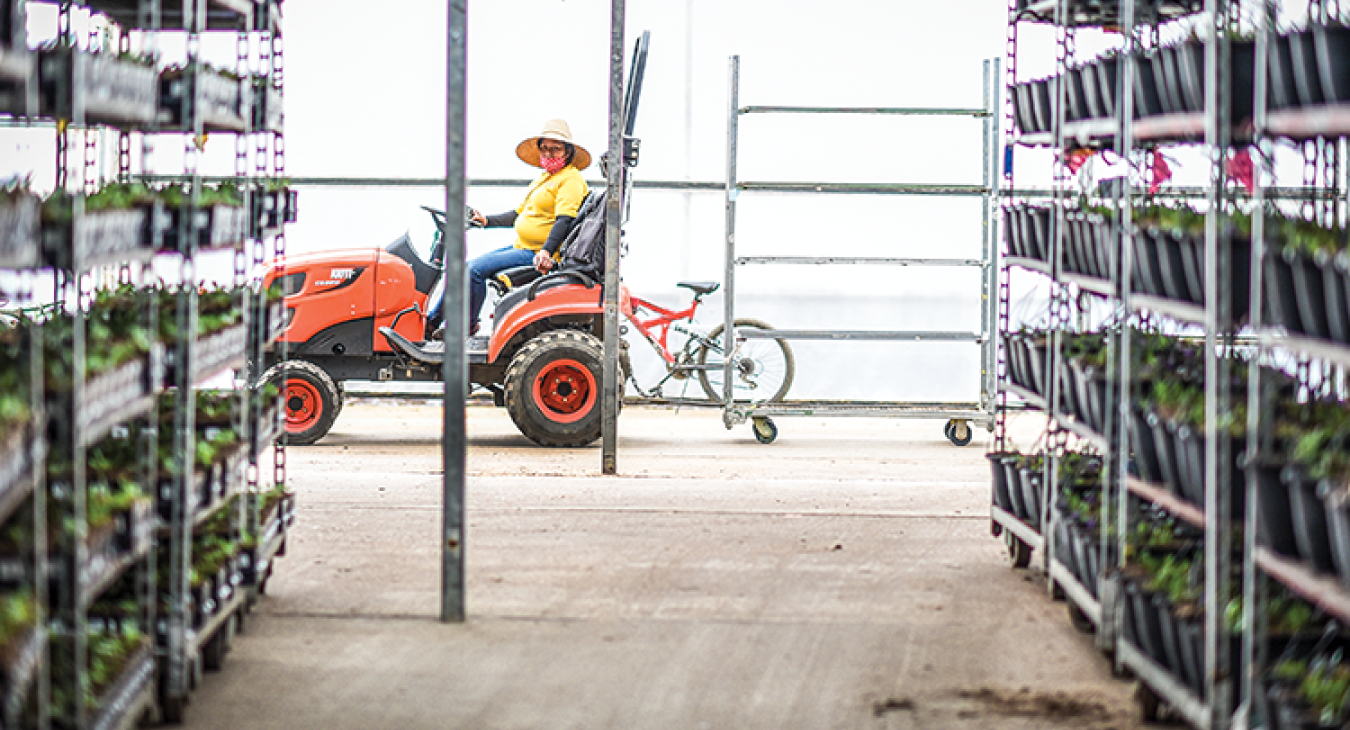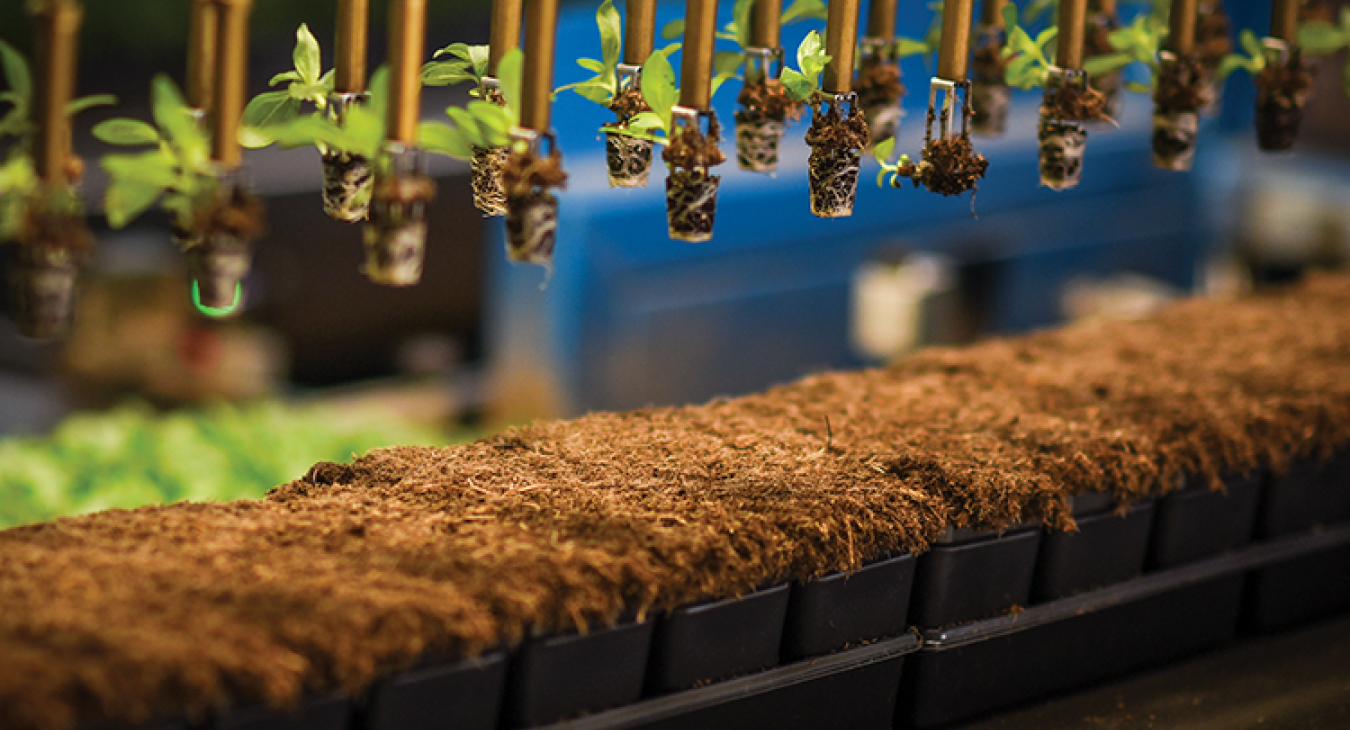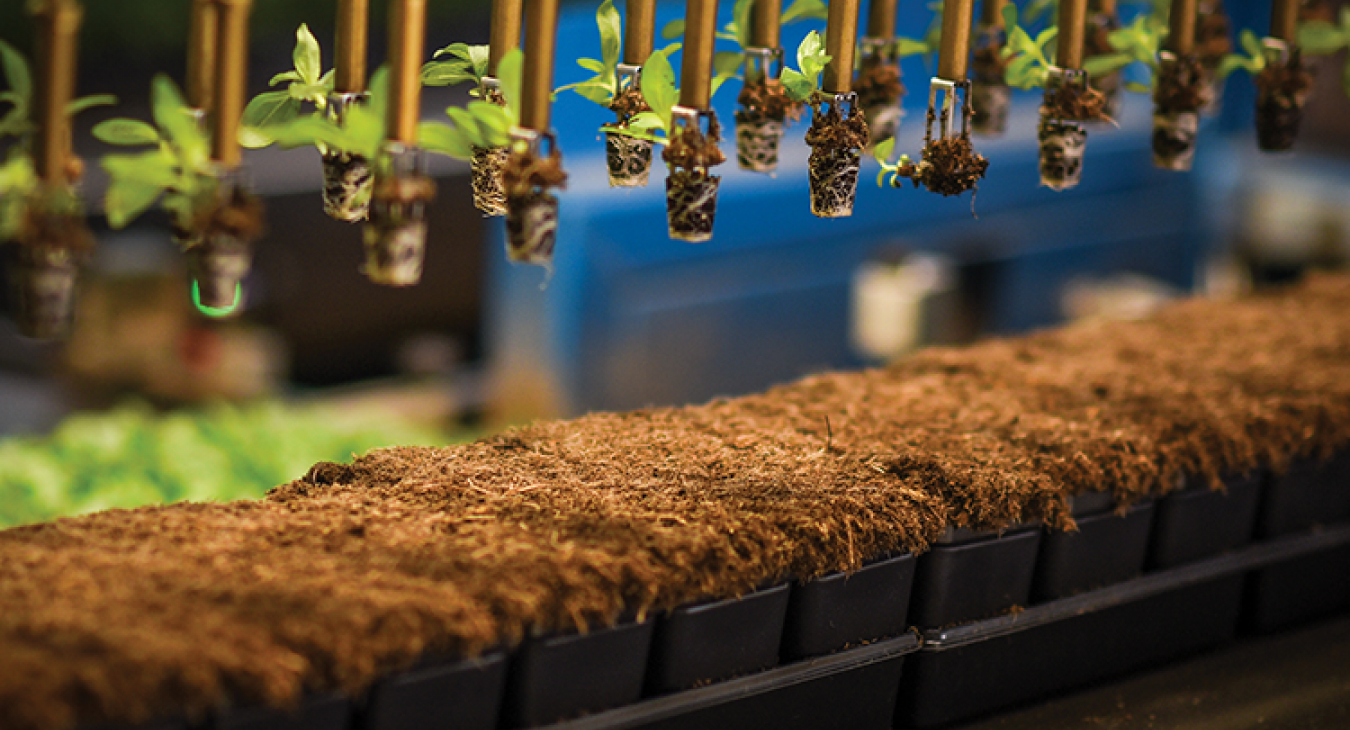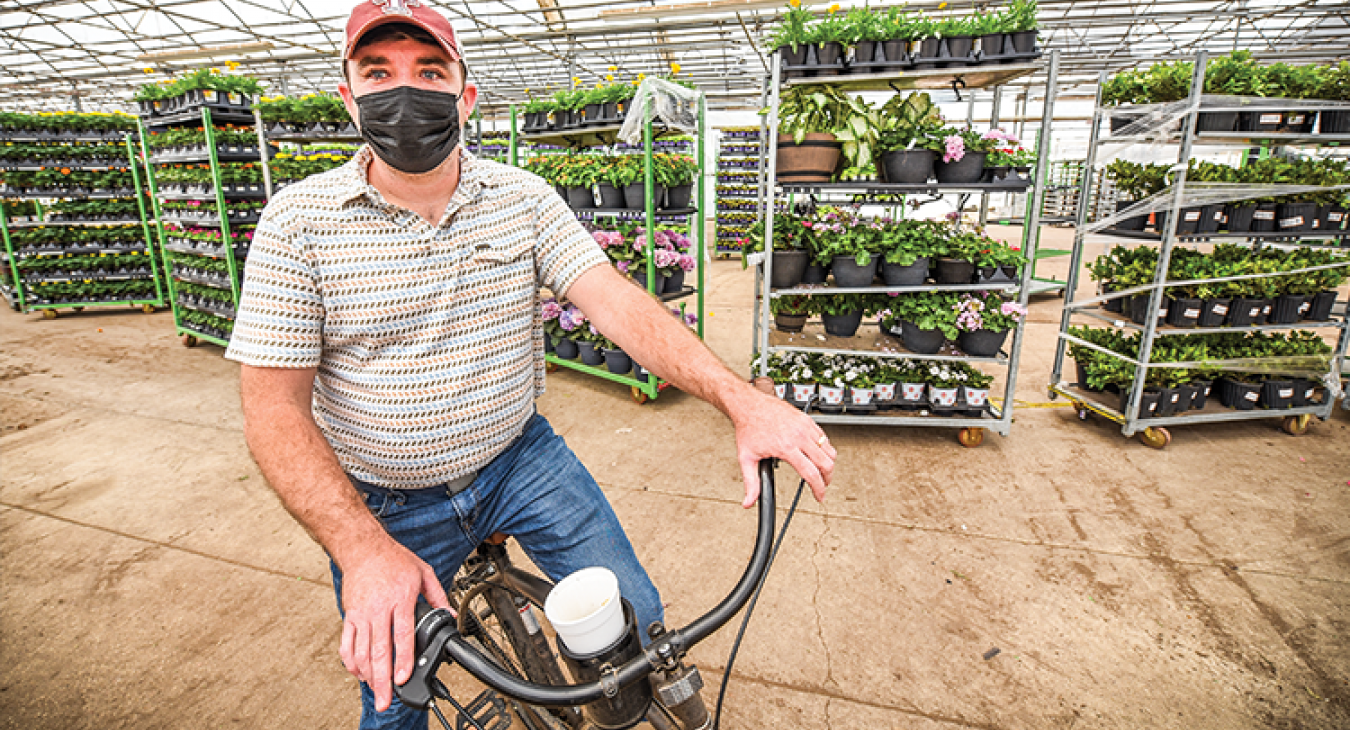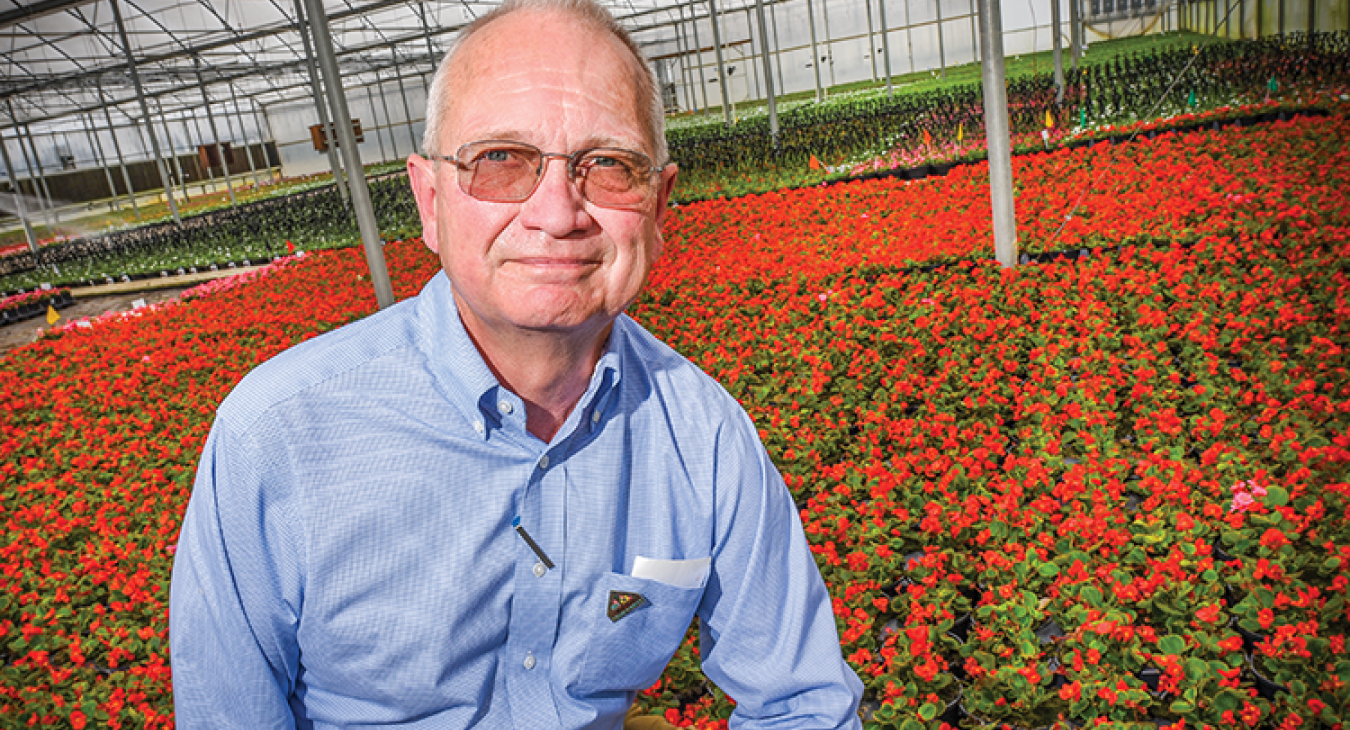Baskets of pink, white and purple petunias line the floor of one of the many greenhouses and shaded fields. (Sarah Beal photo)
Story by Kristin Finan
Photos by Sarah Beal
Drive the central stretch of U.S. 290 between Austin and Houston, and you will fly by mile after mile of uninterrupted farmland dotted with wildflowers, crops or cattle. But 3½ miles west of downtown Giddings, on the south side of the highway, a significant break in the scenery draws attention. Row after row of massive white greenhouses cover 50 acres, as far as the eye can see. Another 20 acres of fields are filled with plants shielded by sunshades.
This unusual landscape is all part of Altman Plants, the largest employer in Lee County.
If you go: Altman Plants
- WHERE: 1180 Private Road 2906, 3½ miles west of downtown Giddings off S. 290
- ONLINE: altmanplants.com
- HOURS: The Altman Plants outlet is usually open to the public from 11 a.m. to 3 p.m. Monday through Thursday, 10 a.m. to 4 p.m. Friday and 8 a.m. to 3 p.m. Saturday.
- PHONE: 979-542-1165 during outlet hours
The 140-acre facility is the biggest commercial nursery in Texas, according to Ron Fox, Altman’s director of southwest U.S. operations. “If you go into the garden shop, say at the Home Depot or Lowe’s, all the annuals, all the pretty flowers, the perennials, those would pretty much all be grown by us,” Fox said.
Touring the facility on a golf cart is like seeing Van Gogh’s palette come to life — rich swaths of purples, pinks, greens and yellows swirl and whirl into an incredible rainbow landscape, each sprawling stretch of greenhouses packed with up to 300,000 plants carefully attended by expert staff. When ready, the plants are trucked to chain retailers. The Giddings location is the primary plant supplier to more than 500 Home Depot, Walmart and Lowe’s stores in Texas and the Southwest. It also distributes to Costco, H-E-B, other grocery stores and independent customers. The plants growing just outside Giddings are trucked as far south as Brownsville and north to Springfield, Mo.
Despite the coronavirus pandemic’s negative effect on many businesses in the last year and a half, this Altman Plants facility has thrived just as much as the plants it houses. A rush of homebound gardeners in 2020, as well as Altman’s proximity to the Austin, San Antonio, Houston and Dallas markets, have been key to the nursery's success.
An expansion is planned on 114 already-purchased acres, which would enlarge the nursery by 81 percent. Greenhouses will sit on 30 acres of the expansion, and 5 acres will be new fields for planting. “We are purchasing more land than is needed for the current expansion, and roughing in what future expansions might look like on our facility planning maps so we will be prepared,” Fox said.
Giddings' Altman by the numbers
15.4 million plants grown per year
140 acres of campus with 50 acres of greenhouse, 20 acres of fields
114 additional acres purchased for future expansion
360 employees, largest employer in Lee County
500 retail locations including Home Depot, Walmart and Lowe’s sell the facility’s plants
As a result of its success, the business has 360 employees (a 41 percent increase in workers since 2015), many of whom specialize in the care of a specific type of plant. Giddings State School, a juvenile justice facility run by the state, is the second largest employer in Giddings and Lee County, said Denice Harlan, executive director of the Giddings Chamber of Commerce.
Altman has seven smaller Texas locations: one in Austin, one in Huntsville, two in San Antonio and three in Troup, 20 miles southeast of Tyler in East Texas. The company also operates nurseries in California, Colorado and Florida. Altman purchased the Giddings nursery, which was previously Color Star, in 2014.
Altman Plants was founded in California by Ken and Deena Altman in 1975 after their hobby of collecting and growing cacti and succulents in their Los Angeles backyard outgrew their expectations. Today the couple remain active in the company, which states on its website that it is the largest cactus and succulent grower in the world. While some of those succulents now grow in Texas, the majority of them, and all of the cactus varieties, are grown in California.
In total, Altman Plants has nearly 35 million square feet of greenhouse space in the U.S., according to industry estimates.
Altman grows roughly 10 percent of the nation’s poinsettias, more than 750,000, are grown at the Giddings facility annually. There are 124 different types of plants grown in Giddings: 85 percent are annuals such as petunias and vincas; 13 percent are perennials, like salvias and hostas; and 2 percent are bulbs. Over the course of a full growing season, 15.4 million individual plants can take root at the Giddings facility.
“The bar we set for ourselves is really high,” said Fox, who has worked in horticulture since 1982 and joined Altman Plants in 2015. “As we get bigger, we won’t be just as good as we are now. As we get bigger, we will get better. So far, we’ve been able to do that.” On any given day, thimble-size plants, about 290 to a tray, that sprouted in California are trucked to the Giddings location. Workers move them into larger pots either by hand or with a mechanical transplanting machine that delicately and rhythmically plucks the tiny plants from their trays, repots them in a soil mix that’s blended on site and sends them down the assembly line to be labeled.
On any given day, thimble-size plants, about 290 to a tray, that sprouted in California are trucked to the Giddings location. Workers move them into larger pots either by hand or with a mechanical transplanting machine that delicately and rhythmically plucks the tiny plants from their trays, repots them in a soil mix that’s blended on site and sends them down the assembly line to be labeled.
From there, the plants go to the greenhouses, where workers closely monitor light, temperature, fertilizer and water, making adjustments in the greenhouses to suit each type of plant. The greenhouses include dual heat systems as well as an evaporative cooling system to support crops year-round. Rainwater and runoff is captured and funneled into four onsite reservoirs and circulated throughout the facility and onto the plants. The Giddings location gets its electricity from both Bluebonnet Electric Cooperative and a new floating solar array, the first of its kind in Texas.
Depending on the size of a plant, an acre of greenhouse space may house anywhere from 30,000 plants in 6-inch pots to 300,000 plants in 1-inch cell packs. Each curved white roof you see from the highway is a 30-foot-wide greenhouse. The greenhouses are connected to one another with a rain gutter between them, and each total connected structure is a 5- to 10-acre “greenhouse range,” Fox said. Within each range, a single plant variety can grow in a 1- to 2-acre section where temperatures and light are controlled separately.
All that space is why many employees use bicycles to more easily traverse the expansive property.
Altman's most popular potted plants per year
- Vincas — 1.7 million
- Petunias — 1.1 million
- Mums — 834,000
- Lantanas — 768,000
- Poinsettias — 705,000
- Zinnias — 596,000
- Impatiens — 590,000 (including New Guinea, Sunpatiensnand the standard annual impatiens)
- Dianthuses — 587,000
- Begonias — 552,000
- Purslanes — 502,000
In the fields, about 90 percent of the plants — such as autumn garden mums — are sheltered by sunshades to reduce the heat during scorching summers and protect tender plants from hail.
Once the plants are ready to leave for their retail destinations, they are stacked on tall metal shelves on wheels that are connected to one another and pulled by tractors through the facility, looking like tall, thin plant trains.
On any given day, more than 70 trucks leave the Giddings location for destinations across the American Southwest.
Despite a year filled with growth and innovation, Fox said navigating the pandemic has “been an experience like no other.”
“In mid- to late March 2020, our business dropped off precipitously and we were concerned that our customers were going to be deemed non-essential businesses or that they might continue to operate but that they might decide to close their garden shops,” Fox said. “It was a particularly stressful time for us because we had our peak inventory in the greenhouses at that point, everything was potted for the spring to open up and the product is all highly perishable.”
By mid-April 2020, though, Fox said the demand picked up dramatically “and continues to this day.
“The demand for our product actually went up because people felt like planting flowers in their yard was something they could still do that was safe and wholesome and would relieve stress.”
The popularity of plants during the pandemic prompted Altman’s facility in Giddings to do something it had never done: sell plants directly to the public. Now, curious passers-by can finally see a bit of what’s growing in the big greenhouses. Six days a week, visitors can peruse aisles chock-full of discounted plants and flowers ranging from Boston ferns in hanging baskets to jalapeño plants. Because the outlet, which opened in March 2021, is easy to see from U.S. 290, Fox said they have an entirely new customer base.
“It was a very impromptu affair to start with, but we timed it just right because people were starting to come out and they had a severe case of cabin fever. We had an incredible number of customers during those first weeks when we opened it,” Fox said. “We have more interaction with the community in a day now than what we would have in a whole month. People just seem to continue to be really excited about it.”
Altman’s is always experimenting with new varieties of plants, Fox said. Home Depot runs a trial garden at the Giddings facility, where it tests new plants and flowers it might add to its aisles. Although none of the Giddings-based trials have impacted the retail market yet, Altman has seen successes from trials at other locations, such as the disease-resistant “True Bloom” rose and the “Purple Princess” bougainvillea, with blooms that retain a deep magenta color all year long.
“We’re always trying to figure out how we can say ‘yes’ to the customer,” Fox said, “and do everything possible we can to keep them happy."
It’s a philosophy that’s paid off for Lee County, said Harlan of the Giddings Chamber of Commerce. Altman has been generous, donating to local businesses and nonprofits. The company has donated plants to the chamber to beautify its courtyard and sponsored the Giddings High School plant sale.
Suggested plants for Texas gardens
- Salvias — Depending on the variety, they can last until winter’s cold arrives. They are generally deer resistant, but butterflies hummingbirds and bees love them.
- Rudbeckias (aka orange conefl wers or black-eyed Susans) — These can handle the heat, offer bright yellow and orange-yellow blooms and fuzzy foliage, and are somewhat deer resistant.
- Asclepias (aka butterfl weeds) — They help build the Monarch butterfl population by providing food for the caterpillars to eat; they can also withstand the Texas heat.
- Lantanas — This hardy plant can hold up in all kinds of gardens and keep blooming even in Texas summers.
- Vincas — This gets the prize as the top annual to hold up in the heat. Altman grows the Titan series in Giddings because it can handle high humidity without having disease issues.
- Verbenas — These pretty plants will continue to bloom, even in summer.
“We are extremely happy to have Altman Plants in Giddings, Texas,” Harlan said. “We have watched them grow over the past several years, and we have seen them become an integral part of our community. The employees are our friends and neighbors. They are growing, innovative, community-conscious and a huge part of the culture of Giddings.”
Download this story as it appeared in the Texas Co-op Power magazine »

